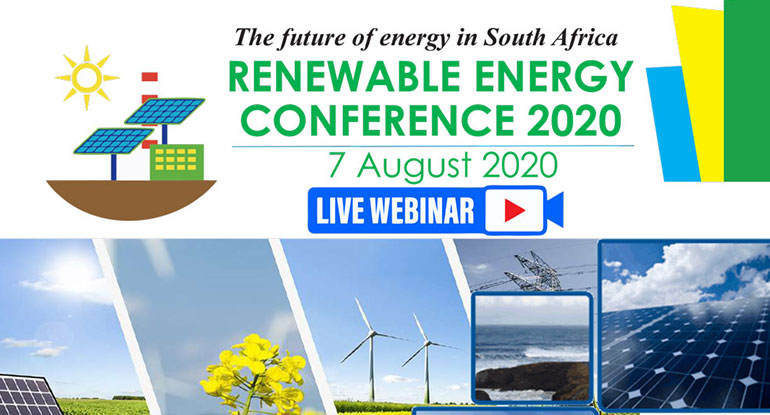
WEBINAR: Renewable Energy Conference
South Africa’s state electricity utility Eskom is in dire financial straits and is struggling to meet demand, which has led the government to woo independent renewable energy producers to help power the country (BusinessTech). Renewable Energy is a clean energy source which can be regenerated for an indefinite period of time. Unlike energy sources which are generated through fossil fuels like coal, oil and gas (they contribute to global warming, threaten water supplies, pollute the environment and have many health risks), most renewable energy sources are clean sources of energy, e.g. they don’t emit any greenhouse gasses and with constantly improved technology are becoming more mainstream. Fossil fuels generate greenhouse gasses which can be blamed for rising temperatures and climate changes. Renewable energy is the future and investments in this technology will not only benefit our generation, but many generations to come. Renewable energy is just more sustainable over the long term. Some known renewable energy sources are: Solar Energy (Both heating and electricity generating), Wind Energy, Geothermal Energy Sources, Hydro Power, Biogas or Biofuel.
With the ever-rising cost of traditional fossil fuels-based energy, renewable energy is becoming a viable option. Renewable energy can be produced on a large macro scale to a small micro environment like solar heating at home. South Africa still has an abundance of fossil fuels in the form of coal, hence the many existing and newly developed coal powered power stations. At the same time South Africa has an abundance of sunshine which lends itself very well for solar water heating and electricity generation. With increasing prices of coal powered electricity, solar powered heating and electricity is becoming more attractive. Some of the advantages of renewable energy are: potentially unlimited supplies, clean energy without production of greenhouse gasses, cost of creating energy besides of initial investment is low, renewable energy projects can also bring economic benefits to many regional areas, renewable energy can bring power to remote areas due to smaller scale of operations. While renewable energy has many advantages, it has some disadvantages as well. The main disadvantage is intermittent supply. For example, solar power only works during the day, you need an effective way to store the energy for later use. Storage cost for renewable energy can be costly and are not always environmentally friendly.
Renewable Energy will become an economic driver and generator of employment for future generations as well. Brenda Martin, chief executive officer of the South African Wind Energy Association, says the renewable power program has already created about 36,500 jobs and has the potential to create many more (Engineering News). Currently demand is still low due to cost factors, but rising energy cost, improved technology and lower cost will see demand for renewable energy improving. Countries and organizations investing in renewable energy research and production are investing for the future and will see great benefits in the future. Economic advantages from Renewable Energy will benefit local communities as well, due to the fact that renewable energy can be implemented closer to communities where there is demand for energy. With the recent severe load-shedding occurring in South Africa, the demand for renewable energy is likely to increase. South Africa’s draft energy plan through 2030 sees 24,370 megawatts of generating capacity coming from wind, natural gas, solar and hydropower plants, which equates to about half of Eskom’s current installed capacity (BusinessTech). This conference brings together experts, specialists and private sector players to discuss and exchange their vision, experiences and solutions to hasten the scale-up of renewable energy in South Africa
